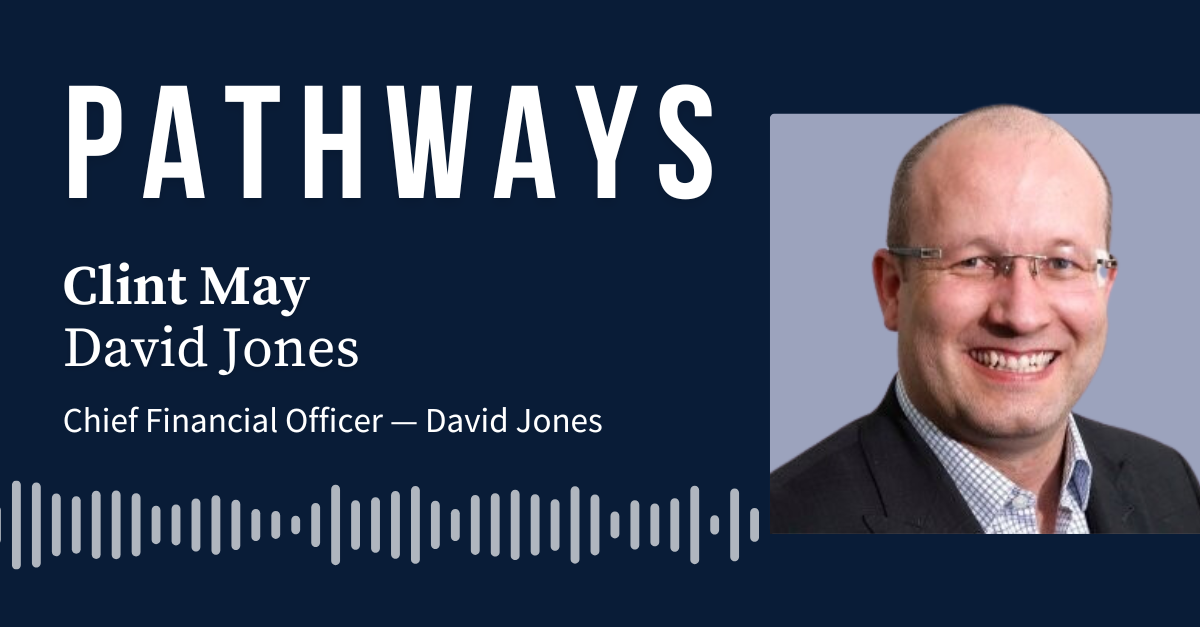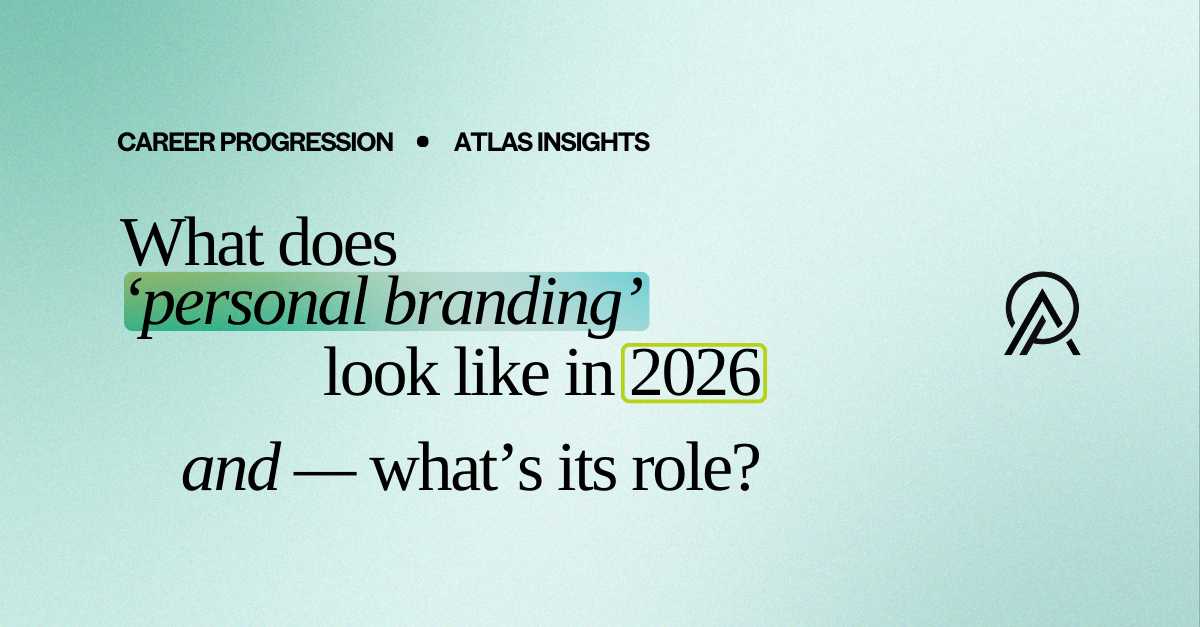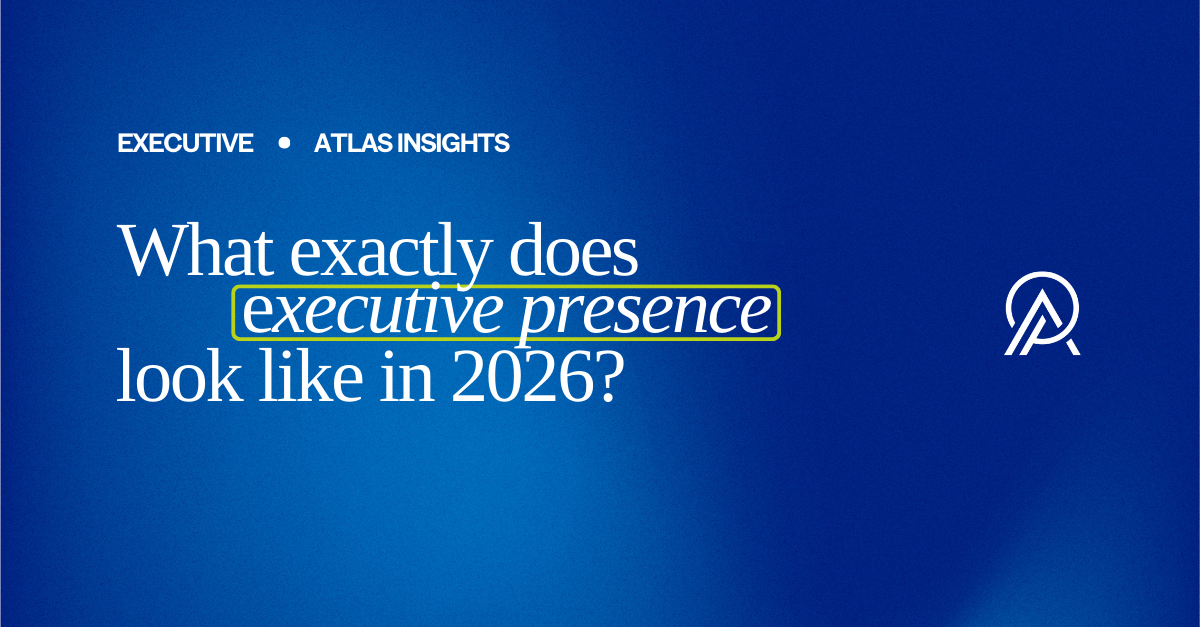
You won’t find many CV’s like Clint May’s. With a track record of delivering business outcomes for major retail brands including Carpet Court and the Spotlight Group — it comes as no surprise that omni-channel power-house David Jones came knocking.
The ‘turnaround specialist’ joined Liam Killen, Director of Atlas Partners for Pathways to chat about his rise to Chief Financial Officer, for one of Australia’s household names.
Liam: I’m here with Clint May, CFO of David Jones. Clint, thanks so much for joining me.
Clint: Great to be here.
Liam: Clint, thank you again for being here to talk us through your journey. You’ve got one of the more unique CFO pathways in Melbourne. I’d love to start with your pre-accounting days. Tell us about your early career in the automotive industry and what you gained from that experience.
Clint: Sure. I finished Year 10 in a small country town in WA. I was very into cars, motorbikes, and all that. Living on a farm, I initially wanted to be a mechanic, but my dad gave me some great advice: if I wanted to be a mechanic, I’d have to leave home. He didn’t want me doing it in a small town, so I joined the army instead. I did eight years there—a four-year apprenticeship and another four years after that.
It was a very different start, and it made me grow up quickly. At 16, I was a boy who’d never really left home, never been on a plane, and only been to Perth three times—to play football. So, moving to the other side of Australia was a huge culture shock.
A couple of things I took from the army are the importance of team-first mentality and the value of simplicity. Being a mechanic, you often have to think simple first. When you’re in the middle of nowhere trying to fix a vehicle, you can easily overcomplicate things. Often, the solution is right in front of you if you don’t overthink it. I carry those lessons with me every day.
Liam: Terrific. You eventually transitioned into finance. Tell us about that decision and the foundation of your early accounting career.
Clint: When I left the army, I realised I didn’t want to be a mechanic forever. I was ambitious and thought about buying a business, though I wasn’t sure what kind. I considered a lawnmowing round or a news agency, but my partner at the time suggested I needed some business skills first. So, I went to an open day at Curtin University and met an ex-army professor who advised me to try Accounting 101. He said if I liked it, it could count towards a degree, and if not, I’d still gain some skills.
I found it logical and enjoyed the new environment. It was challenging – I hadn’t done Years 11 and 12, so I had to teach myself math and take English lessons. But things escalated from there. The dean at Curtin made a deal with me: if I passed four out of five units and got an English pass, he’d let me enrol as a mature-age student. That’s how my accounting journey started, and I really loved it.
Liam: And from there, you found your way into the corporate world. Could you walk us through your career journey and that first move into the C-suite?
Clint: Breaking into the professional world was tough. While at university, I worked for free for 18 months to gain experience. I sent CVs to every business in Perth, working in small accounting firms, at Tennis West, and in restaurants. I just wanted a chance to learn. Eventually, I landed two days a week at PKF, where a partner gave me an opportunity despite my lack of experience. I learned a lot, even if my dress sense—an olive-green suit—wasn’t the best!
After that, I joined a larger accounting firm in Perth. My big break came when I joined Wesfarmers Corporate, one of the biggest companies in Australia. I learned a lot there. I was always ambitious, so I did my CPA right after my degree and then an MBA at the University of WA. Later, I joined a company called Fluor Daniel in WA, managing a joint venture with BHP as the client.
Then I applied for a role at Holden, which required an engineering background with a finance tilt. I had both, so I took a pay cut to move to Melbourne with my family—a big risk but worth it. From there, I held roles at CSL, General Electric, and even did a startup. My career accelerated when I joined Coles during its turnaround. That role taught me to manage larger teams and navigate complex environments.
Liam: Amazing journey. Looking back, what was the toughest adjustment in that first CFO role at Carpet Court?
Clint: The toughest part was realising you can’t please everyone, and as a CFO, you must stand for something. Often, you’re the logical, common-sense voice in the room. You’re involved in every part of the business, which can make it a lonely role. But it’s also important to define your approach. For me, that meant being a commercial, operationally focused CFO—not just sitting in the back room crunching numbers. Some of my mentors advised me to decide what I stand for, and I chose to be commercial.
Liam: Fantastic advice. When you moved to Spotlight, retail was facing significant challenges, especially during COVID. Talk to us about that time, and the acquisition of Harris Scarfe.
Clint: I’d been at Spotlight for 12 months when COVID hit. Our CEO had just returned from China, and we started hearing about the virus. Around that time, we were approached to buy Harris Scarfe. We did the due diligence mostly internally, with some help from PwC. Spotlight’s owners are entrepreneurs who make decisions quickly, so by February we decided to buy Harris Scarfe, even as COVID loomed.
Then, as COVID intensified, we had to refinance Spotlight Group. The banks were getting nervous, and suddenly we were facing the possibility of zero revenue in a multi-billion-dollar organization. It was intense, with big decisions affecting employees, suppliers, and landlords. But I had great support from my boss, a strong peer group, and a very experienced treasurer. We pulled every lever we could to stay afloat.
The Harris Scarfe acquisition closed on April 1, right as COVID was ramping up. We didn’t know how it would turn out, but it ended up being a fantastic acquisition. It was a tough period, but separating work and home life, exercising, and keeping a balanced perspective helped me get through it.
Liam: Now at David Jones, where are you focusing your efforts?
Clint: I’m the CFO, but my remit is broad. I oversee the transformation office (our PMO), supply chain, commercial team, legal, and the financial accounting functions. It’s a fantastic role for someone like me who’s operational and commercially focused.
David Jones is an iconic brand with an incredible history but was underinvested during its time with overseas ownership. With Anchorage Capital now owning it, we’re on a massive transformation journey—revamping supply chain, e-commerce, loyalty programs, and more. We’re investing in stores, processes, people, and systems. In two to three years, this business will look very different. It’s an exciting time to be here.
Liam: You’ve built a reputation as a turnaround specialist. What draws you to these types of challenges?
Clint: I enjoy challenges. I believe that the more you put in, the more you get back. Stable, steady roles don’t suit me—I’d drive everyone nuts. I like to be involved, make changes, and tackle tough situations.
I didn’t set out to be a turnaround specialist, but I keep ending up in roles where things need to change. I think when you’re positive and proactive, good opportunities come your way. So, I’d advise anyone to put themselves out there because when things do go right, it’s incredibly rewarding.
Liam: Great advice. Can you share a “sliding doors” moment in your career?
Clint: Moving to Melbourne for the job at Holden was a big one. I remember discussing it with my partner at the time—we’d be taking a $10,000 pay cut, which was over 10% of my salary back then, and we had a one-year-old. It was a huge decision, but we backed ourselves and took the leap. We didn’t know anyone in Melbourne, but it turned out to be one of the best decisions. That was 21 years ago now, and I’m a true Melburnian. Sometimes, you must show courage and take the harder path.
Liam: You seem to have had a great network and some strong mentors. Are there any mentors you think fondly of for the impact they had on your career?
Clint: Yes, I’m a big believer in mentorship. I realised early on that, being so inexperienced, I needed help. My approach to mentorship has evolved over time. My best friend, whom I met on the first day of my MBA, is a very smart businessman in the mining sector. We became close friends, and I learned a lot from him, especially in the early days of my MBA.
There were also some key people at Wesfarmers, like a gentleman named Michael Wedgwood, who really helped me. I didn’t interact with him frequently, but I admired his style—he was incredibly smart, and I was drawn to how he operated. I sought his feedback whenever I could. Mentors change at different stages of your career. You don’t just find one mentor and keep them for 30 years; they come and go as your needs evolve.
I really value those relationships, and I still maintain them. I try to connect with various mentors at different times, depending on what’s happening in my career. They’ve been incredibly valuable, particularly because they give honest feedback—which isn’t always what you want to hear. I encourage people to listen to that feedback and use it to improve. Mentors often know you well, and they’ve usually been successful, so they know the path to success. They’ve been invaluable to me, and I’ll always have mentors around me.
Liam: This interview has been full of great advice, but if you had to pinpoint one specific piece of advice for future CFOs, what would it be?
Clint: I’ll give a couple of pieces, if that’s alright. First, be known for something—stand for something and know who you are. In business, there are a lot of clichés, but ultimately, it’s all about execution. Don’t get caught up in just looking good or talking the talk; execution is what wins the day. Get things done.
On a more personal note, I probably wasn’t patient enough early in my career, and that hurt me. So, have a bit of patience. When you stay positive, good things tend to come your way.
Liam: Clint May, thank you so much for joining us.
Clint: Thank you.




